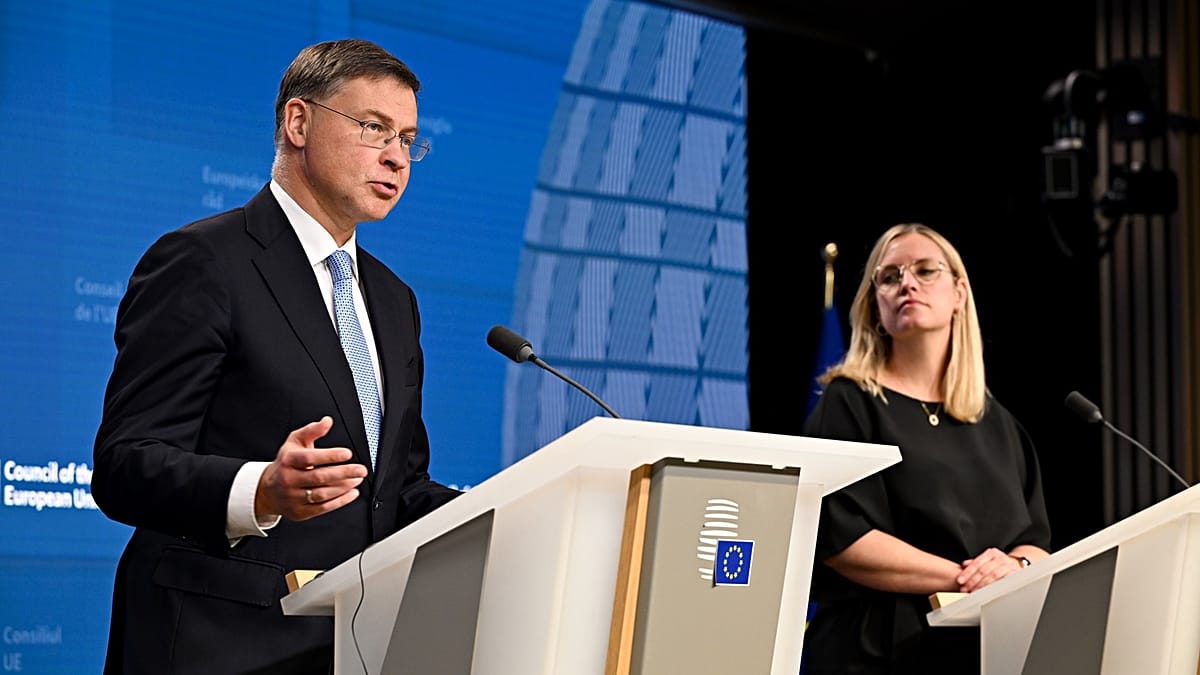Political pressure is mounting on Belgium to lift its reservations and agree to a bold plan to issue an unprecedented reparations loan for Ukraine using the Russian frozen assets.
The proposal would see a €140 billion loan issued as the main financing vehicle to fund Ukraine’s military and budget needs for the next two years. The idea is groundbreaking and support for it is intensifying after the European Commission and finance ministers praised its merits as the best option available.
“My takeaway is that the Commission’s proposal is the best and most realistic option and should be treated as a matter of highest priority, and we’ll continue to work closely with all member states to explore the best way forward,” said Danish Finance Minister Stephanie Lose, who chaired the meeting in her capacity as rotating presidency.
Valdis Dombrovskis, the European Commissioner for the Economy, said the unprecedented plan would secure Ukraine’s funding without “placing additional burden” on member states with limited fiscal capacity.
“There was wide recognition that this option is the most feasible means of quickly bridging Ukraine’s funding gap without placing additional substantial fiscal burden on member states,” Dombrovskis said.
The Commissioner stressed that any assistance provided to Ukraine should largely be done as grants to keep the war-battered country’s debt burden in check. This means that if the Russian assets are spared, the alternative would be to raise money on the markets, either jointly by the EU or individually by member states.
“There are other options. We discussed them. But obviously, they come with higher fiscal costs for member states,” he said.
“So that’s just the fact. And we need to be clear about this.”
Ukraine will need a fresh injection of foreign aid in the second quarter of 2026. The first quarter should be covered by the other G7 allies under an ongoing line of credit.
“We are under time pressure and must move forward in a constructive, pragmatic and cooperative way,” Dombrovskis said.
Earlier on Thursday, Ursula von der Leyen described the reparations loan as the “most effective way” to support Ukraine’s fight for freedom and raise the costs for Moscow.
Ukrainian President Volodymyr Zelenskyy said the loan would be a “big-big loss” for Russia. “To freeze money is one thing, but to give it to Ukraine is another,” he wrote.
Kyiv would only repay the loan if Moscow agreed to pay for war reparations.
The risks due to inaction are greater than the alternative
Still, Belgium has not signaled it will sign off the plan any time soon.
As the host of Euroclear, the depository that houses the immobilised Russian assets, the country fears it would be the prime target of the Kremlin’s retaliation. Belgium and Russia are bound by a Soviet-era investment treaty that foresees arbitration.
Belgian Prime Minister Bart De Wever has demanded the “maximum” legal certainty, including binding guarantees from all member states to ensure the “full mutualisation” of risks and total transparency in listing the Russian assets held in other jurisdictions.
The technical talks between Belgium and the European Commission have focused on these outstanding issues but have failed to deliver a breakthrough.
“No progress at all so far,” a Belgian source familiar with the discussions told Euronews. The same official regretted the Commission’s insistence on the reparations loan despite a mandate from leaders to explore other options.
“Zero risk is not realistic, but the risks are still extremely high. It’s not certain how this will impact the eurozone,” a source close to the Belgian government’s thinking said. “We want a legal text for complete burden sharing. We have done our homework.”
The impasse has raised doubts that EU leaders will manage to endorse the reparations loan when they meet again in December for a crunch summit. If the deadline is missed, the bloc might have to resort to an interim solution to prevent Kyiv’s default.
Asked about the Belgian concerns, Dombrovskis said the Commission was working “very seriously” to address them, without elaborating what else it could offer.
“Obviously, there needs to be solidarity and those risks need to be shared, he said.
“There are always risks associated with action and with containing the aggressor, but the risks of inaction and not containing the aggressor are even greater.”
Meanwhile, Paschal Donohoe, the president of the Eurogroup, said the reparation should advance once the “reasonable” demands of the Belgian government are considered and all alternatives explored.
“There are strong merits to the reparation loan, but there are also trade-offs,” Donohoe told Euronews in an exclusive interview. “We are expecting a formal proposal from the European Commission, and after that, the debate on how to move forward will intensify.”

